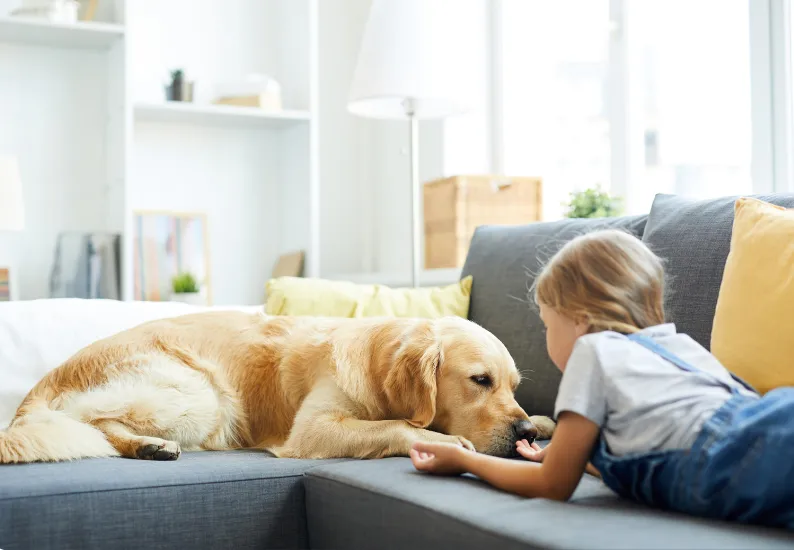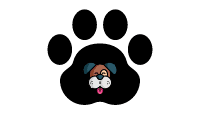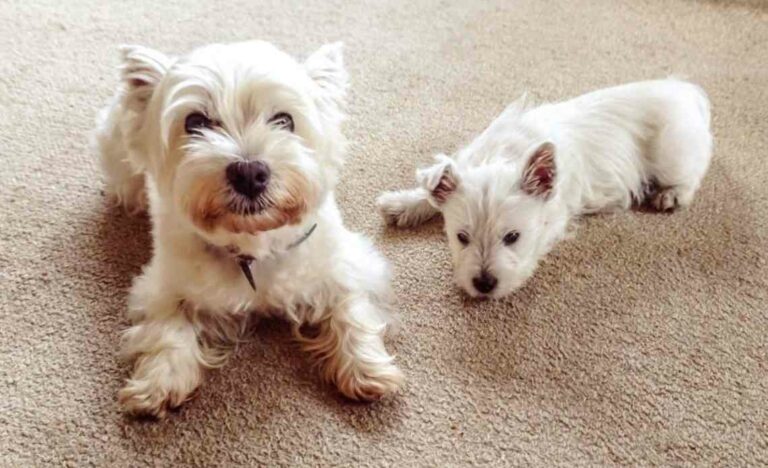Why Does My Dog Not Like Me But Like Everyone Else? 5 Reasons & Vet Advice
As a dog lover, it can be heartbreaking when your furry friend doesn’t seem to like you as much as they do other people. It’s easy to take it personally and wonder what you’re doing wrong. However, there are many reasons why your dog might not show you the same affection they show others. This article will explore possible causes and offer tips and tricks to help you build a better relationship with your dog.

Table of Contents
- Introduction to the problem – feeling rejected by your dog
- Possible reasons why your dog may not like you
- Understanding dog behavior and body language
- Building trust with your dog – tips and tricks
- Common mistakes that can make your dog dislike you
- Seeking professional help – when to consider a dog behaviorist
- Dealing with jealousy – when your dog likes someone else more
- Advice for building a better relationship with your dog
- Conclusion
- FAQ
Introduction to the problem – feeling rejected by your dog
It’s not uncommon for pet owners to feel rejected or hurt when their dog doesn’t seem to like them. After all, we provide them with food, water, shelter, and love.
Why Does My Dog Not Like Me But Like Everyone Else? It is important to remember that dogs are individuals with their personalities, preferences, and quirks. Like humans, they might click better with some people than others.
Additionally, dogs don’t perceive the world in the same way we do. They communicate through body language, smell, and sound, and their behavior can be influenced by various factors such as breed, age, health, and past experiences.
Possible reasons why your dog may not like you
Several possible explanations exist for why your dog might not seem to like you. It’s essential to keep in mind that each dog is unique, and what works for one might not work for another.
However, here are some common reasons why your dog might prefer other people:
Lack of socialization
Dogs that haven’t been exposed to a variety of people, animals, and environments during their critical socialization period (between 3 and 14 weeks of age) might struggle to bond with their owners.
They might also be fearful or aggressive towards strangers or other dogs.
Inconsistent or harsh training
Dogs thrive on consistency, positive reinforcement, and clear communication. If you’re inconsistent with your training, use harsh methods, or fail to reward good behavior, your dog might become confused, anxious, or resentful.
Physical punishment or yelling can also damage your relationship and make your dog afraid of you.
Lack of exercise and mental stimulation
Dogs are active animals that need physical exercise and mental stimulation to stay healthy and happy. If you’re not providing enough opportunities for your dog to burn off energy and engage in fun and challenging activities, they might become bored, restless, or destructive.
This can also lead to separation anxiety, which might make your dog clingy or needy toward other people.
puppiesdiary
Understanding dog behavior and body language

To build a better relationship with your dog, it’s essential to understand their behavior and body language.
Dogs communicate primarily through nonverbal cues, such as:
- Tail position and wagging speed: A high and stiff tail indicates alertness or aggression, while a low and relaxed tail indicates calmness or friendliness. The speed and direction of the wagging can also convey different emotions, such as excitement, fear, or appeasement.
- Ear position and movement: Erect or forward ears indicate interest or alertness, while flattened or backward ears indicate fear, submission, or aggression.
- Eye contact and blinking: Direct eye contact can be seen as a challenge or threat while avoiding eye contact can indicate fear or submissiveness. Slow blinking can be a sign of trust, affection, or relaxation.
- Body posture and movement: A tense or stiff body posture can indicate discomfort, fear, or aggression, while a relaxed and loose posture indicates comfort and trust. Dogs also use gestures such as play bows, head tilts, or paw lifts to signal their intentions or emotions.
By observing and responding appropriately to your dog’s body language, you can show them that you understand and respect their needs and feelings. This can help build trust and strengthen your bond over time.
Building trust with your dog – tips and tricks
Don’t give up hope if your dog doesn’t seem to like you as much as you’d like.
Here are some tips and tricks to help you build trust and improve your relationship:
Spend quality time together
Dogs thrive on attention and affection from their owners. Make sure to spend dedicated time with your dog every day, engaging in activities they enjoy, such as playing, walking, or training.
This can help them associate you with positive experiences and strengthen your bond.
Use positive reinforcement
Reward your dog for good behavior, such as following commands, being calm, or playing nicely. Use treats, toys, or praise to reinforce desired behaviors and avoid punishing or scolding them for mistakes or accidents. This can help your dog feel confident and motivated to please you.
Be consistent and patient
Dogs need clear and consistent rules and boundaries to feel safe and secure. Please ensure everyone in your household is on the same page regarding training and behavior expectations.
Don’t expect instant results or perfection from your dog, and avoid getting frustrated or angry. Instead, be patient, kind, and supportive.
Understand and address any underlying issues
If your dog’s behavior is causing you significant distress or affecting their quality of life, consider seeking professional help. A dog behaviorist or trainer can assess your dog’s behavior and provide tailored advice and training plans.
They can also help you address any underlying medical, environmental, or socialization issues contributing to your dog’s behavior.
puppiesdiary
Common mistakes that can make your dog dislike you

Sometimes, we unknowingly make mistakes that can damage our relationship with our dogs.
Here are some common mistakes to avoid:
Being too demanding or rough
Dogs are sensitive animals, easily overwhelmed or hurt by too much pressure or rough handling. Avoid forcing them to do uncomfortable things, such as hugging, kissing, or petting. Instead, respect their boundaries and let them approach you on their terms.
Neglecting their needs
Dogs have basic needs that must be met to stay healthy and happy, such as food, water, exercise, and medical care.
Neglecting any of these needs can lead to physical or emotional problems and damage your relationship with your dog. Make sure to provide for your dog’s basic needs and seek professional help if you’re struggling.
Comparing them to other dogs
Every dog is unique and special in their way. Comparing your dog to other dogs regarding looks, behavior, or abilities can make them feel inadequate or unappreciated. Instead, focus on your dog’s strengths and achievements and celebrate them.
puppiesdiary
Seeking professional help – when to consider a dog behaviorist
Sometimes, despite our best efforts, our dogs might not respond to our attempts to build a better relationship. In such cases, it’s essential to seek professional help.
A dog behaviorist or trainer can help you identify any underlying issues, such as anxiety, aggression, or fear, and provide customized solutions.
They can also teach you how to communicate effectively with your dog, set realistic goals, and monitor your progress.
Dealing with jealousy – when your dog likes someone else more
It’s not uncommon for dogs to show a preference for one person over another, even within the same household. While this can be hurtful or frustrating, avoiding letting jealousy or resentment cloud your judgment is essential.
Here are some tips for dealing with jealousy:
Focus on your relationship with your dog
Rather than obsessing over who your dog likes more, focus on building a positive and healthy relationship with them.
Spend quality time with your dog, engage in activities they enjoy, and work on training and behavior issues together. This can help strengthen your bond and improve your dog’s happiness and well-being.
Avoid competing with the other person
Avoid trying to outdo or compete with the other person for your dog’s affection. This can create tension and resentment and damage your relationship with your dog and the other person.
Instead, focus on building your unique relationship with your dog based on mutual trust, respect, and love.
Communicate openly and respectfully
If you’re feeling hurt or left out, it’s essential to communicate openly and respectfully with the other person.
Avoid blaming or accusing them; instead, express your feelings and concerns in a calm and non-judgmental way. Seek their input and try to find common ground. Remember that your dog’s happiness and well-being should be the top priority for both of you.
Advice for building a better relationship with your dog
Building a strong and healthy relationship with your dog takes time, patience, and effort. It’s important to remember that each dog has a unique personality, preferences, and needs.
However, by understanding their behavior and body language, spending quality time together, using positive reinforcement, and seeking professional help, you can improve your relationship with your dog and enjoy many happy years together.
Conclusion
If your dog doesn’t seem to like you as much as they do other people, don’t take it personally. There are many possible reasons why your dog might prefer other people, such as lack of socialization, inconsistent or harsh training, or lack of exercise and mental stimulation.
By understanding your dog’s behavior and body language, building trust through positive reinforcement and quality time, avoiding common mistakes, seeking professional help when needed, and dealing with jealousy constructively, you can build a better relationship with your dog and enjoy a fulfilling and rewarding bond.
Related Articles: –
How Can You Tell If A Dog Is Mentally Challenged?
Why Did My Puppy Stop Sleeping With Me? [8 Reasons]
https://www.puppiesdiary.com/how-long-will-a-dog-hide-if-scared/
FAQ
Can dogs sense when you don’t like them?
Yes. Dogs are highly attuned to human emotions and body language. If you’re feeling anxious, fearful, or angry around your dog, they might pick up on those signals and become wary or avoidant.
Why does my dog follow me everywhere but doesn’t seem to like me?
Dogs follow their owners for many reasons, such as seeking attention, protection, or safety. However, if your dog doesn’t like you, it might be due to a lack of trust, socialization, or inconsistent training.
Can you change a dog’s preference for someone else?
While you can’t force a dog to like you, you can improve your relationship with them by building trust, using positive reinforcement, and spending quality time together. Seek professional help if your dog’s behavior is causing significant distress or affecting their quality of life.
Can dogs be jealous of other people or animals?
Yes, dogs can experience jealousy or possessiveness towards their owners, other dogs, or other people. However, it’s essential to address such behavior constructively, using positive reinforcement and clear communication.
How can I tell if my dog likes me?
Dogs show affection in many ways, such as wagging their tail, leaning against you, following you around, licking your face or hands, cuddling, or bringing you toys or treats. However, it’s essential to consider your dog’s overall behavior, body language, and any underlying issues that might affect their relationship with you.

![Why Does My Dog Hump Me Only During My Period? [Hidden Truth] 4 Why Does My Dog Hump Me Only During My Period? [Hidden Truth]](https://www.puppiesdiary.com/wp-content/uploads/2023/03/Why-Does-My-Dog-Hump-Me-Only-During-My-Period-768x462.webp)

![Why Did My Puppy Stop Sleeping With Me? [8 Reasons] 6 Why Did My Puppy Stop Sleeping With Me? [8 Reasons]](https://www.puppiesdiary.com/wp-content/uploads/2023/04/Why-Did-My-Puppy-Stop-Sleeping-With-Me-768x497.webp)
![Do Dogs Mate If Not In Heat? [3 Vet Advice] 7 Do Dogs Mate If Not In Heat? [3 Vet Advice]](https://www.puppiesdiary.com/wp-content/uploads/2023/03/Do-Dogs-Mate-If-Not-In-Heat-768x456.webp)

![Why does my dog keep moving her puppies? [ 5 Reason & Solution] 9 Why does my dog keep moving her puppies? [ 5 Reason & Solution]](https://www.puppiesdiary.com/wp-content/uploads/2023/04/Why-does-my-dog-keep-moving-her-puppies-768x535.webp)